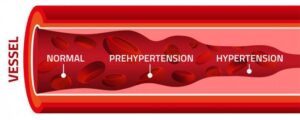Last updated on September 26th, 2024 at 11:15 am
Hypertension treatment is a critical aspect of maintaining good health, as high blood pressure, often referred to as the “silent killer,” can lead to severe health complications if left unmanaged. Millions of people around the world suffer from hypertension, and understanding how to effectively treat and control it is paramount to a longer and healthier life.
Before delving into hypertension treatment options, it’s essential to grasp the significance of high blood pressure. Hypertension is a condition in which the force of blood against the walls of your arteries is consistently too high. This excessive pressure can damage your arteries and increase your risk of developing various cardiovascular diseases, such as heart attacks, strokes, and kidney problems.
Hypertension (High Blood Pressure) Treatment
The best treatments for Hypertension are mentioned below in detail:
Lifestyle Modifications: The Foundation of Hypertension Treatment
In many cases, the initial approach to hypertension treatment involves lifestyle modifications. Here are some crucial lifestyle adjustments to consider:
- Dietary Changes: Adopting a heart-healthy diet low in salt, saturated fats, and processed foods can help lower blood pressure. The DASH (Dietary Approaches to Stop Hypertension) diet is a popular choice, emphasizing fruits, vegetables, whole grains, lean proteins, and low-fat dairy products.
- Regular Exercise: Engaging in regular physical activity, such as brisk walking, swimming, or cycling, can contribute to lower blood pressure. Strive to accumulate a minimum of 150 minutes weekly engaged in moderate-intensity physical activity.
- Stress Management: Persistent stress has the potential to heighten blood pressure levels. Practice stress-reduction techniques like meditation, yoga, or deep breathing exercises to help keep stress levels in check.
- Limit Alcohol and Caffeine: Excessive intake of alcohol and caffeine has the potential to elevate blood pressure levels. If you choose to consume these substances, do so in moderation.
- Quit Smoking: Smoking stands out as a prominent contributor to the development of hypertension, posing a substantial risk factor for this medical condition. Quitting smoking can lead to a substantial reduction in blood pressure and lower your risk of heart disease.

Medications for Hypertension Treatment
While lifestyle modifications can be highly effective, some individuals may require medication as part of their hypertension treatment plan. Several classes of medications are available to help lower blood pressure:
- Diuretics: These medications, also known as water pills, help the body eliminate excess sodium and water, reducing blood volume and pressure.
- ACE Inhibitors and ARBs: Angiotensin-converting enzyme (ACE) inhibitors and angiotensin II receptor blockers (ARBs) relax blood vessels, making it easier for blood to flow.
- Calcium Channel Blockers: These medications relax blood vessels and reduce the heart’s workload, resulting in lower blood pressure.
- Beta-Blockers: These drugs slow the heart rate and reduce the force of the heart’s contractions, which can lower blood pressure.
- Alpha-Blockers and Central Agonists: These medications work to relax blood vessels or decrease nerve signals that cause blood vessels to constrict.
- Combination Medications: In some cases, a combination of different classes of medications may be prescribed to achieve optimal blood pressure control.

Regular Monitoring and Follow-Up
Regardless of the hypertension treatment plan chosen, regular monitoring and follow-up with a healthcare provider are essential. Blood pressure should be checked regularly, and medication adjustments may be necessary to achieve and maintain target levels.
Pulmonary Hypertension Treatment
Pulmonary hypertension (PH) is a complex and often progressive condition characterized by high blood pressure in the pulmonary arteries, which are responsible for carrying oxygen-poor blood from the heart to the lungs for oxygenation. This condition can lead to a variety of symptoms, such as shortness of breath, fatigue, and chest pain, and if left untreated, it can severely impact a person’s quality of life and lead to life-threatening complications. Fortunately, advances in medical science have provided several treatment options to manage pulmonary hypertension effectively.
Pulmonary hypertension treatment focuses on alleviating symptoms, improving quality of life, and slowing the progression of this potentially life-threatening condition. It approach varies depending on the underlying cause and severity of PH.
Pulmonary Hypertension Medication
Medications are a cornerstone of PH management. Vasodilators, such as prostacyclin analogues, endothelin receptor antagonists, and phosphodiesterase-5 inhibitors, help relax and widen the pulmonary arteries, reducing blood pressure. Anticoagulants may be prescribed to prevent blood clots in cases of chronic thromboembolic pulmonary hypertension (CTEPH).
Oxygen therapy is often used to enhance oxygen delivery to vital organs, easing symptoms like breathlessness. Lifestyle modifications, including avoiding strenuous activity, maintaining a heart-healthy diet, and staying well-hydrated, can help manage symptoms and improve overall well-being.
Read: What are Generic Medicines?
In some cases, surgery may be necessary for pulmonary hypertension treatment. Pulmonary thromboendarterectomy (PTE) is performed to remove chronic blood clots in CTEPH patients, while lung or heart-lung transplantation may be considered for severe cases.
Conclusion:
Hypertension treatment is a multifaceted approach that involves lifestyle modifications, medication when needed, and ongoing monitoring. By actively managing high blood pressure, individuals can reduce their risk of severe complications and enjoy a healthier, longer life.
Remember that hypertension is a chronic condition, and consistency in treatment and lifestyle choices is key to success in keeping it under control. If you have concerns about your blood pressure, consult with a healthcare professional to develop a personalized hypertension treatment plan tailored to your needs.
> Consult a doctor and Order Medicine Online
Benefits Of Generic Medicine
Generic medicines offer several key benefits. They are typically more affordable than brand-name equivalents, making healthcare more accessible. Generics undergo rigorous testing to ensure they are as safe and effective as their brand-name counterparts.
This affordability and reliability allow more people to access essential medications, improving overall healthcare affordability and reducing the financial burden on individuals and healthcare systems alike.
FAQs on Hypertension Treatment
Q:1 What is hypertension treatment?
Hypertension treatment typically involves lifestyle modifications like dietary changes and exercise, along with medications when necessary, to lower high blood pressure and reduce the risk of related health complications. Regular monitoring and follow-up with a healthcare provider are crucial for effective management.
Q:2 Can lifestyle changes alone effectively treat hypertension?
Lifestyle changes, such as a healthy diet, regular exercise, and stress management, can help manage hypertension, but some individuals may also require medication for optimal control.
Q:3 What are common medications for hypertension treatment?
Common hypertension medications include diuretics, ACE inhibitors, ARBs, beta-blockers, calcium channel blockers, and combination drugs tailored to individual needs.
Q:4 Is hypertension treatment lifelong?
Hypertension is a chronic condition, and treatment is often required for life. Regular monitoring and adherence to treatment plans are essential for long-term blood pressure control and overall health.
Related Links:
